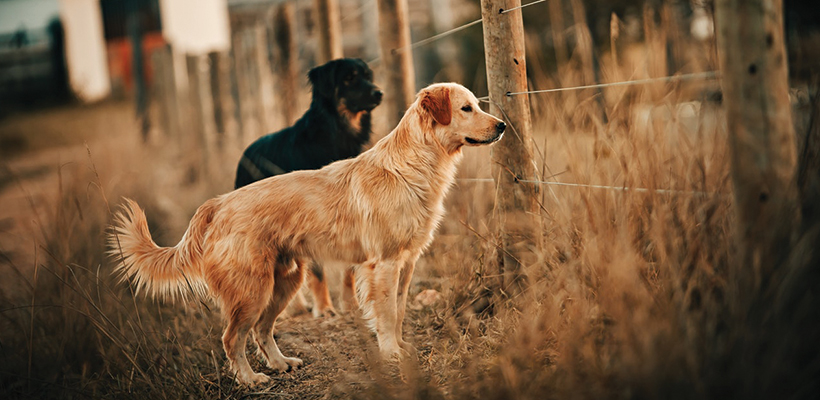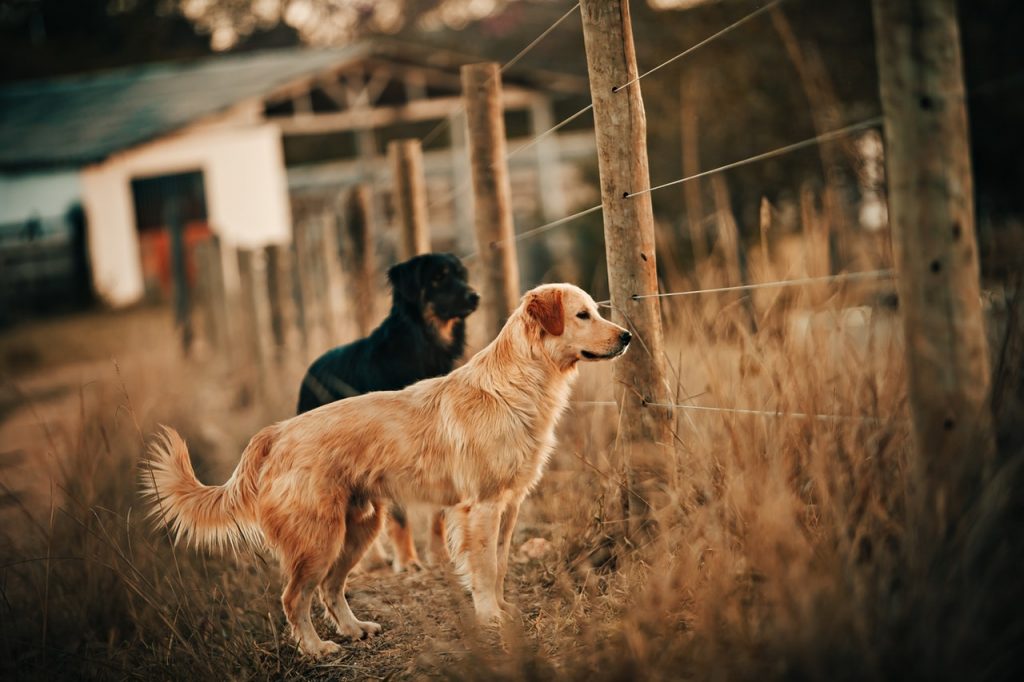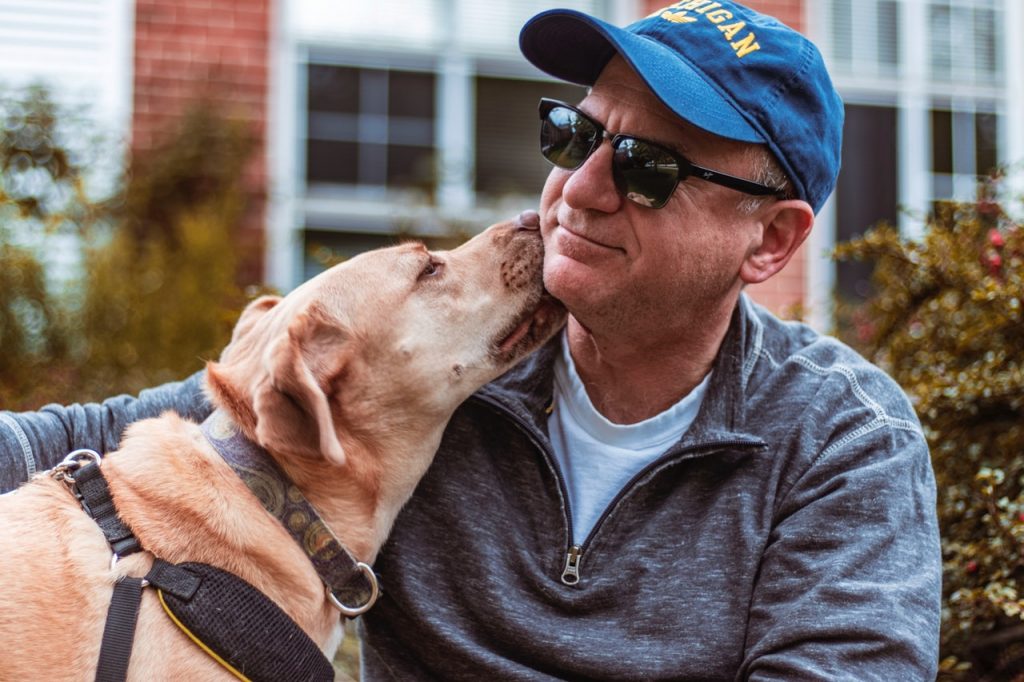
Last Updated on September 26, 2023
This article is contributed by guest writer, Jacob O. (Author at DOG IDEAS).
How to Keep Your Dog From Running Away
10 million pets – that is how many animal companions are lost each year in the United States. According to the American Humane Association, 15 percent of runaway dogs without microchips or tags are ever reunited with their owners.
Statistics like these are heart-breaking.
But even with all that you do to protect your dog they may persist in running away. This worrisome habit is all too common in many dogs today and it is one that causes dog owners untold worry and stress.
Why does your dog run away? What causes this distressing behavior? How can you make it stop? How can you plan for a quick reunion? Learn what you need to know in this article.
Why Does My Dog Run Away From Home?
Believe it or not, your dog may not intend to run away. In fact, your pup may not even realize that this is what is happening, even though it keeps running away repeatedly.
Different dog breeds have been bred for different purposes, with different drives and predilections. Some dog breeds are simply more disposed to run, whether it is away from something threatening or towards something interesting.
Of course, as an owner, you may not know what (if anything) is triggering your dog to run off again and again. Reading through these common reasons dogs run away might help you make more sense of your own dog’s behavior.

Photo Credit: Helena Lopes via Pexels
1. Your dog gives chase
Squirrel. Just the word probably evokes images of slavering, barking, wild-eyed pooches in perennial pursuit of that most elusive of prey – the scampering squirrel.
What is it about squirrels that seem to incite every dog on the planet to give chase? In fact, it isn’t just squirrels that do it – cats, other dogs, birds, even fallen leaves or snowflakes can cause some dogs to get up and give chase.
These dogs may not “come to” and realize they are far, far away from home until it is too late to retrace their steps and find their way back.
2. Your dog feels afraid
Fireworks. It is a rare canine indeed that isn’t scared witless once the sparks start flying overhead. Fireworks are simply not something that dogs can put into context, understand and make peace with.
Similarly, very loud planes or helicopters, blaring music, crashing thunder and lightning storms and other sound and sight triggers can send even the most stoic pup into a flight of fear.
Your dog likely has no intended destination in mind when the fear overtakes them. Rather, the goal is to simply get to anywhere other than here, and sometimes that is very far away indeed.
Another less common but still well-documented reason why some dogs run away is because they are trying to return to a more familiar place they associate with “home.” This type of fear-based runaway behavior is more common right after a big move when the dog is not yet comfortable in the new space.

Photo Credit: Pixabay via Pexels
3. Your dog gets bored
People aren’t the only species that get bored. Dogs can get pretty bored too and there are only so many couch cushions a pup can rip up before new activities are in order.
As a bored pup who is home alone or left alone, any opportunity knocking is potentially better than what they’ve already got. An escape opportunity in this context is likely not viewed as a getaway at all, but rather as a new adventure to liven up a dull moment.
Some dog breeds that really love to jump or dig may get involved in these favorite activities when outside in the yard and not even realize they have run away until they are up and over or under and out and have gotten themselves into a situation they can’t get out of.
These primal breed-specific traits won’t resolve on their own and often won’t be remedied even with training. Rather, it is necessary to simply secure the yard against digging or jumping – or never leave your dog outside unattended.
Otherwise, sadly, since dogs live perpetually in the moment, your pup probably will never understand that you can’t find them easily no matter where they go and how far away they wander.

Photo Credit: Helena Lopes via Pexels
4. Your dog smells a mate
One of the biggest and most problematic triggers for wandering dogs is the scent of a female dog in heat. While you might not be able to smell it even when standing right next to an unfixed female, you can be sure your dog smells it around the block and all the way down the street.
Even a fixed male dog can still get riled up by the scent of a breeding-ready female dog of any species. The instinct to mate is a strong primal urge that demands to be followed.
Unfortunately, it usually isn’t possible to convince a neighbor with an unfixed pet to remedy the situation so your dog will stay inside the fence. You may never even know that is the reason your dog keeps sneaking out, but it is always worth remembering regardless.
5. Your dog gets curious
Researchers today are steadily studying and learning more than ever before about canine intelligence.
Not only do researchers want to understand why humans and dogs share such a unique bond, but there is also a drive to understand new emerging canine gifts such as the ability to sniff out distress, seizures and even cancer.
Ultimately, these and so many other gifts might just boil down to one universal canine trait: curiosity. Dogs are endlessly curious. It is one of the many reasons we love them so much – a dog views each moment through the eyes of expectant wonder and delight.
Where this can become problematic, however, is when a stimulus presents itself for your dog’s curiosity to ponder and then that stimulus starts heading away. Of course your pup was born to follow.
Certain breeds, such as dachshunds and bloodhounds, can be so persistent in the presence of certain stimuli, such as scent trails, that they may follow them for hours or days to the exclusion of all else, including their owners commands.

Photo Credit: Nancy Guth via Pexels
Learn As Much As You Can About Your Dog’s Breed
To stop a dog from running away once again, you must first start by learning as much as you possibly can about your dog’s breed, lineage and history.
This can be more than a little challenging if your pup is a mutt, of course, but genetic testing can shed light on the question to a great degree. If running away is a big problem, it may be worth ordering a DNA test to learn more about what breeds your dog’s parents might have been.
Learning about your dog’s breed can be very helpful in that certain breeds that have been carefully human-bred to do some jobs may simply be inveterate runaways. They have literally been bred for that exact behavior in a working dog context.
For example, certain “working dog” breeds like Collies, Whippets, Greyhounds, Huskies, Beagles, Bloodhounds, Coonhounds, Weimaraners, Foxhounds, Basenji, Terriers and others may simply need to be kept inside secure, fenced, jump-proof, dig-proof, bite-proof areas and never let off leash.
If your dog is a rescue animal, there may also be behavioral issues in the past that occurred before you and your dog met, which may be contributing to the persistent running away behavior you are trying to remedy.
Unfortunately, you may never know what caused your pup to be so deathly afraid of orange cats or lawnmowers, but once you at least identify these fear triggers, you can infer that these are ready triggers that may cause your dog to run.
It can be helpful to keep a list of everything you know about your dog’s breed and past history. You may only start to see patterns emerging as you add to the list over time. Are there certain times of day (or times of year, such as the Fourth of July) when your dog is more likely to run away? The more you can learn, the more you can eliminate opportunities and triggers for your runaway pup.
How to Stop a Dog From Running Away
Figuring out how to stop your dog from running away is a process that needs to happen on multiple levels.
Protect your pup from itself
First, you need to protect your dog from itself by making sure it always wears a tag with your contact number and has been microchipped.
With microchipping, you also need to add a tag to this effect on the collar and be sure to keep your contact information updated in the microchip database.
While you can’t ever be certain that someone who finds your dog will think to have them scanned for a microchip, making sure your dog has both a tag and microchip makes it that much more likely you will be reunited again.

Photo Credit: Kate Amos via Pexels
Protect your yard from your pup
Once you have learned as much as possible about your dog’s breed and personal history, you will have a much better idea of its weak behavioral spots.
Observing its behavior while outside together, and watching from a window to see what your dog does in the yard when it thinks you aren’t watching, can also give you more information about triggers for runaway behaviors.
Perhaps your research and observation has yielded insights that your dog loves to dig and is incapable of resisting the sight of a squirrel. So you decide to add to your fencing and extend the barrier down a foot beneath the soil surface.
This way, the next time the same small furry scampering provocation happens to come along, your dog won’t be able to dig its way out from under the fence.
Remain positive and loving at each reunion or return
One thing you must always do after your dog has run away and you are reunited, is to avoid getting angry. Dogs are very sensitive to human emotion, and anger may actually create fear and more provocation to run away again.
In the same way, try to avoid getting hysterical, stressed or overly emotional while searching for your dog. It is hard, but if your dog is nearby and attuned to you, and senses strong negative emotions, you may have a harder time recapturing your wandering pup.

Photo Credit: thevibrantmachine via Pexels
Train for an emergency “recall word”
Even with every other protection you can put in place, sometimes your dog may give in to instinct, boredom, fear, scent or squirrels, and be off and running yet again.
Now, while your dog is at home and safe, you can already start planning for this possibility by training your dog to come to you or to simply stop and lay down using a recall word.
You will want to pick one or the other since using both may confuse your dog. You don’t want to choose a bland word like “come” for your recall word, since this may not convey sufficient urgency in the face of a strong trigger to run.
Rather, consider something your dog really loves. For many dogs, this word is “food”. Yelling “food” at your dog’s fleeing backside may be enough to halt the sprint and turn those fleet feet around.
Another option for a recall word simply instructs your dog to stop and drop, rather than turn around. For dogs with very short attention spans, a stop and drop command is often a better choice because it is a simpler command. “Stop” or “drop” are good commands to use if you opt for this approach.
By taking the time to see the world through your dog’s eyes, you can often understand at a whole new level why your dog runs away and how to stop this behavior.

FeTherese JUAREZ
November 19, 2019 at 1:51 PMGreat article! I will forward it to friends who have s dog who goes exploring. It may make them more aware of the
dog’s wanderlust.
barbara nixon
November 19, 2019 at 1:55 PMyou forgot some old dogs, from instinct want to go away to be in private to die..so keep a close eye on them…
Jan
November 19, 2019 at 6:51 PMThat’s not always the case. Elder dogs can get dementia and just wander away.
Older dog behavior
https://pethelpful.com/dogs/Dog-Alzheimers
https://www.thespruce.com/senior-dementia-in-dogs-3385016
A good article on how a pet doesn’t always go off to die
https://www.vin.com/vetzinsight/default.aspx?pid=756&catId=5875&id=6175879
https://www.vin.com/vetzinsight/default.aspx?pid=756&catId=5875&id=6175879
Cynthia Cribbs
November 20, 2019 at 2:04 PMOur 15 year old Yorkie has doggie dementia and will just walk very slowly until he stops and then just stand there staring off into space. Add his hard of hearing to it and we have to keep a very close eye on him. I have had to go retrieve him from the back yard so many times I lost count. He gets confused as to where he is and will just stand there.
Lynn
November 22, 2019 at 10:16 PMIt would probably be better for you not to leave him on his own in the yard. It’s so sad but you are a wonderful pet parent.
Sandra Norton
December 4, 2019 at 9:15 AMIv got a Maltese, he’s 15, wanders a lot, I have him in a large in/out area for his protection of wandering, he did once!! I only let him out in the large yard if I’m with him!! Not only because he wanders but Iv spotted hawks on and off!! Iv never had a dog wander off to dye! I have 4 large, 2-labs, 1 -boxer, 1-older rox!! I inspect the fenced area every time we go out! The only dog I had that escaped was a German Shepard, I took him at age 2, either he had done this before or he just missed his first family!! I spotted him across a 6 lane highway!! So after returning him into our yard, I poured concrete around my entire fence!!! A lot of work but was worth it!! He never escaped again!!
Donna Brown
November 19, 2019 at 10:20 PMSome of those older dogs may also have dementia — it’s a real thing!
Lea-Anne Wilke
November 20, 2019 at 2:06 AMI don’t think they go away to die.. I think seniors get very confused very easily. If in pain, they may want to find a quiet place but “sundowners syndrome” etc in senior pets is common
Lea-Anne Wilke
November 20, 2019 at 2:10 AMhttps://www.vin.com/vetzinsight/default.aspx?pid=756&catId=5875&id=6175879
Lea-Anne Wilke
November 20, 2019 at 2:12 AMhttps://wagwalking.com/behavior/why-do-dogs-try-to-hide-when-they-are-dying
Ona Mullis
November 20, 2019 at 1:27 PMThanks for sharing this information !! Very interesting !!
Lisa
December 16, 2019 at 11:02 PMI’ve been wondering a lot lately about the going off to die belief. I’m not so sure they don’t get confused and lost. But bottom line the same is needed. Never take your eyes off your dogs.
Barbara Hamilton
November 19, 2019 at 5:51 PMGood advice ! I have shared.
Holly Godfrey
December 2, 2019 at 5:00 PMAnother very frequent situation of running away is that people who adopt a new dog think it’s safe to let that new dog off leash a couple of days after they get them. The dog has not had time to form an attachment to its new person/people and so it just runs away from these strangers without any idea where its going. New dogs should not be off leash (outside a fenced yard) for at least several weeks after arrival. They need time to bond with their new people and know where their new home is. If they don’t readily come to you when called when on-leash, they probably won’t come when off leash.
Debe
December 5, 2019 at 8:33 PMThis is great info And I love my dog’s and always sleep and cuddle very much. I don’t yell or scream or spank even upon accidentally peeing/etc in house. So it has always bugged me why my dogs “take off” when they get so much love😢🤔 My 19 yr old Siberian Husky ran away to die, And I read this breed does this so you don’t see this end😢….while my 5-7 yr old Sharpei’ ran away getting somehow out of collar when walking….about 3-4 agonizing times…thank the lord he found his way home even moving from home to parent’s home. Longest time was gone about 8-9 hours. I half slept in car outside after searching the neighborhoods and listened for him each time🙏🏻🙏🏻🙏🏻
Debe
December 5, 2019 at 8:35 PMPS. I will never again use the plastic snap collars…only sturdy buckle collars👀🤔
Jeanne h brock
December 15, 2022 at 3:41 PMto many people think their dog goes off to die not true they like humans get dementia, poor eyesight, poor hearing. please donnot let your elderly pet be outside without you.